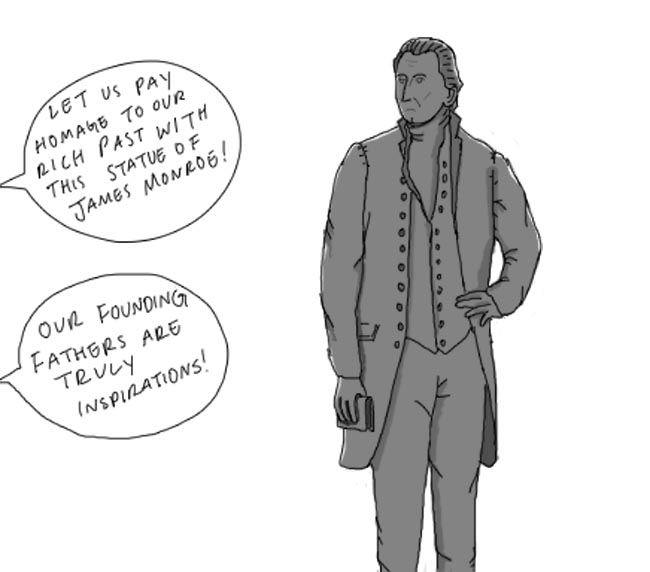As the construction of a statue of James Monroe outside St. George Tucker Hall sparks conversations across campus, the College of William and Mary must once again contemplate its place in history. The College certainly prides itself on its significant role in the founding of the United States. Our obsession with Thomas Jefferson verges on unhealthy. Every brick and archway on campus sings the praises of antebellum Virginia. Our operative adjective remains “colonial.”
This fascination is more than aesthetic. We love the colonial architecture and the winding brick pathways because they give us an ineffable sense of history. They make us feel as though we were there when Jefferson grappled with Rousseau and Locke, when James Monroe felt a revolutionary fervor quickening, when Henry Clay realized the power of oration.
Such features usher us into a noble tradition and give us an identity that feels genuine and ancient. The campus clings to ties that extend far beyond a shared geography. We serve as a living monument to great men of a past era.
Never mind that Thomas Jefferson and James Monroe both owned slaves or that, during their terms as president, both embraced views that found no fault in genocide and mass displacement. They were patriots who should be rewarded for their sacrifice. Never mind that the Brafferton was built to “[propagate the Christian faith] amongst the Western Indians,” as stated in the College’s Royal Charter. Never mind that the College didn’t fully admit black students until 1970.
These were less tolerant times, and besides, we’re not like that anymore. These historical anecdotes are all minor complications that distract from a greater narrative of triumph and exceptionality.
By constructing this memorial, we would continue in our habit of clinging to our narrow conception of history. We would deny that, between then and now, humans have struggled on this campus for justice. We would reject the need for improvements, a need that persists even today.
Foundation is not apogee.
I’m not arguing against the preservation of the College’s colonial past. Acknowledgment of history keeps amnesia at bay. What we should avoid is the all-out fetishization of meticulously selected portions of history. The College can’t seem to come to terms with the fact that time has passed since the turn of the 19th century. We’ve chosen, consciously or unconsciously, to predicate our sense of place on carefully constructed myth. Could we begin to chip away at its foundations?
Monuments tell only one story. As a campus, we are faced with a choice: Do we want to be a monument to an idealized excerpt or a complicated whole?
Email Quinn Monette at qpmonette@email.wm.edu.

